Analyzing the Global Business Environment: SASOL Limited Report
VerifiedAdded on 2020/12/09
|9
|2569
|410
Report
AI Summary
This report provides a comprehensive analysis of SASOL Limited's global business environment. It begins with an introduction to the global business environment and its impact on organizations, followed by an examination of SASOL's structure, culture, and governance using McKinsey's 7S model. The report then applies Hofstede's cultural dimensions to understand how the organization has been influenced by cultural factors. Furthermore, it evaluates the ethical and sustainable factors that SASOL considers in the global market and assesses how these factors affect decision-making. The report also analyzes the strategic expansion routes the organization has taken, specifically focusing on franchising, and discusses the advantages and disadvantages of this approach. The analysis highlights the importance of adapting to global market dynamics, ethical considerations, and strategic decision-making in achieving sustainable business success. The report concludes by summarizing the key findings and emphasizing the significance of understanding the global business environment for organizations like SASOL Limited.
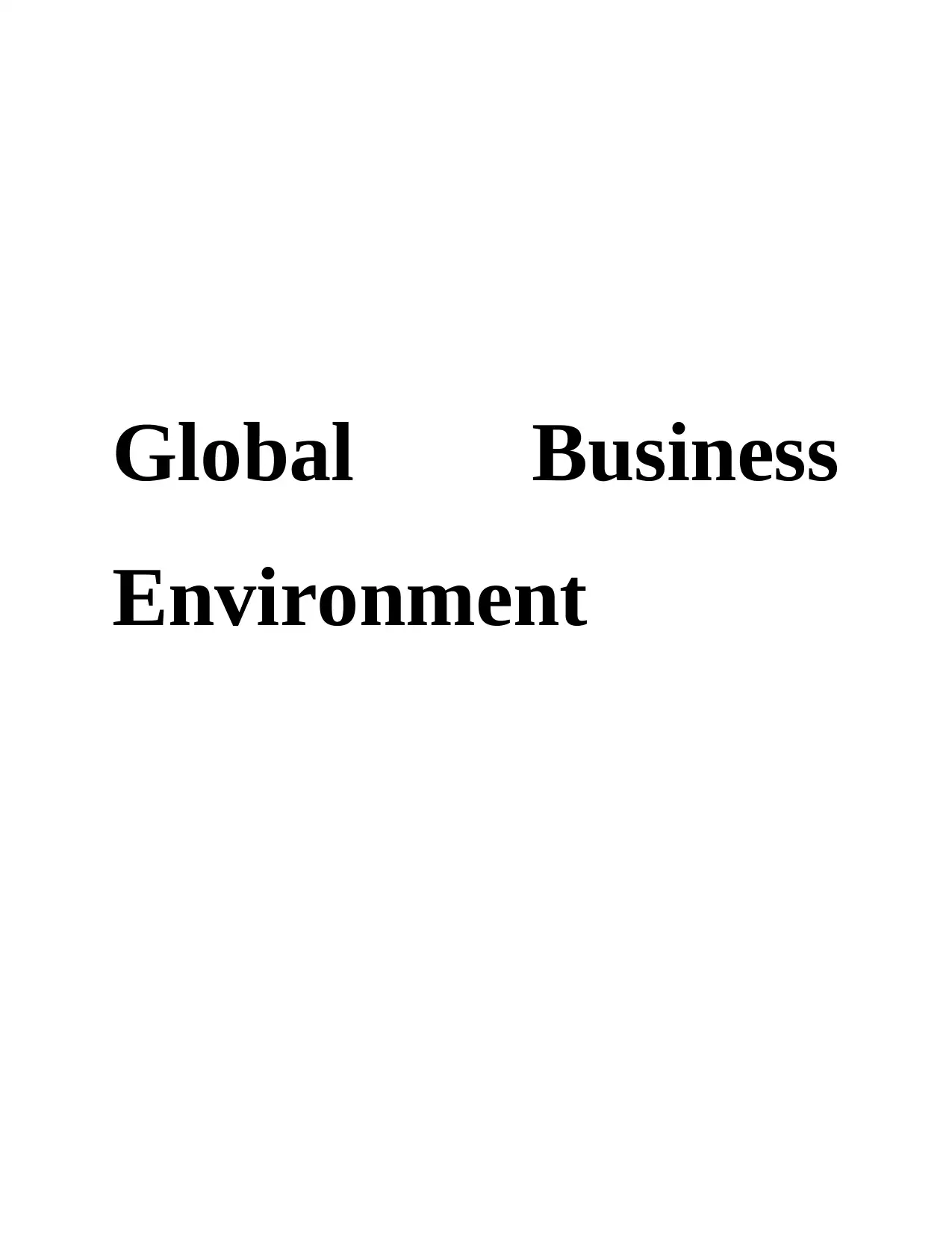
Global Business
Environment
Environment
Paraphrase This Document
Need a fresh take? Get an instant paraphrase of this document with our AI Paraphraser
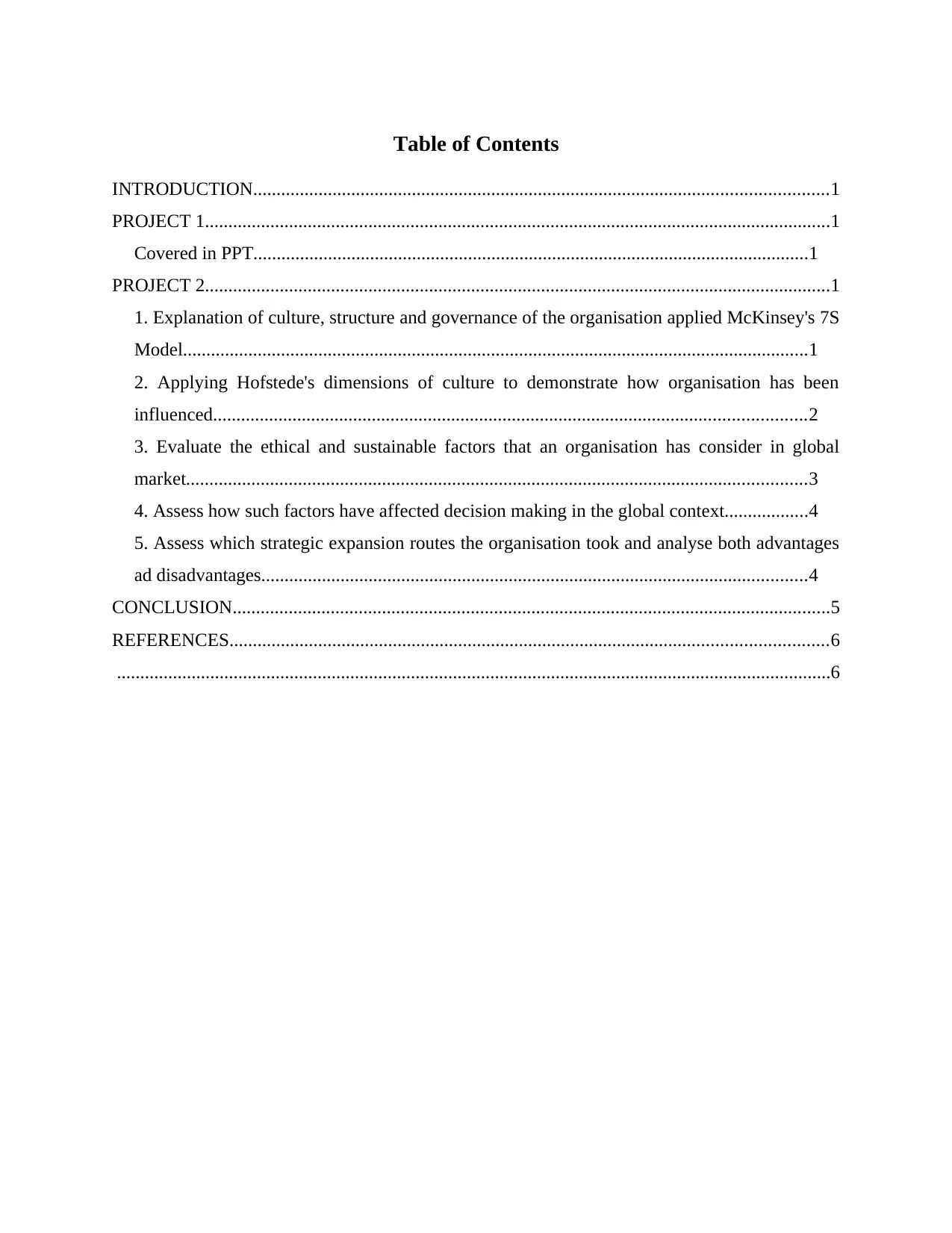
Table of Contents
INTRODUCTION...........................................................................................................................1
PROJECT 1......................................................................................................................................1
Covered in PPT.......................................................................................................................1
PROJECT 2......................................................................................................................................1
1. Explanation of culture, structure and governance of the organisation applied McKinsey's 7S
Model......................................................................................................................................1
2. Applying Hofstede's dimensions of culture to demonstrate how organisation has been
influenced...............................................................................................................................2
3. Evaluate the ethical and sustainable factors that an organisation has consider in global
market.....................................................................................................................................3
4. Assess how such factors have affected decision making in the global context..................4
5. Assess which strategic expansion routes the organisation took and analyse both advantages
ad disadvantages.....................................................................................................................4
CONCLUSION................................................................................................................................5
REFERENCES................................................................................................................................6
.........................................................................................................................................................6
INTRODUCTION...........................................................................................................................1
PROJECT 1......................................................................................................................................1
Covered in PPT.......................................................................................................................1
PROJECT 2......................................................................................................................................1
1. Explanation of culture, structure and governance of the organisation applied McKinsey's 7S
Model......................................................................................................................................1
2. Applying Hofstede's dimensions of culture to demonstrate how organisation has been
influenced...............................................................................................................................2
3. Evaluate the ethical and sustainable factors that an organisation has consider in global
market.....................................................................................................................................3
4. Assess how such factors have affected decision making in the global context..................4
5. Assess which strategic expansion routes the organisation took and analyse both advantages
ad disadvantages.....................................................................................................................4
CONCLUSION................................................................................................................................5
REFERENCES................................................................................................................................6
.........................................................................................................................................................6
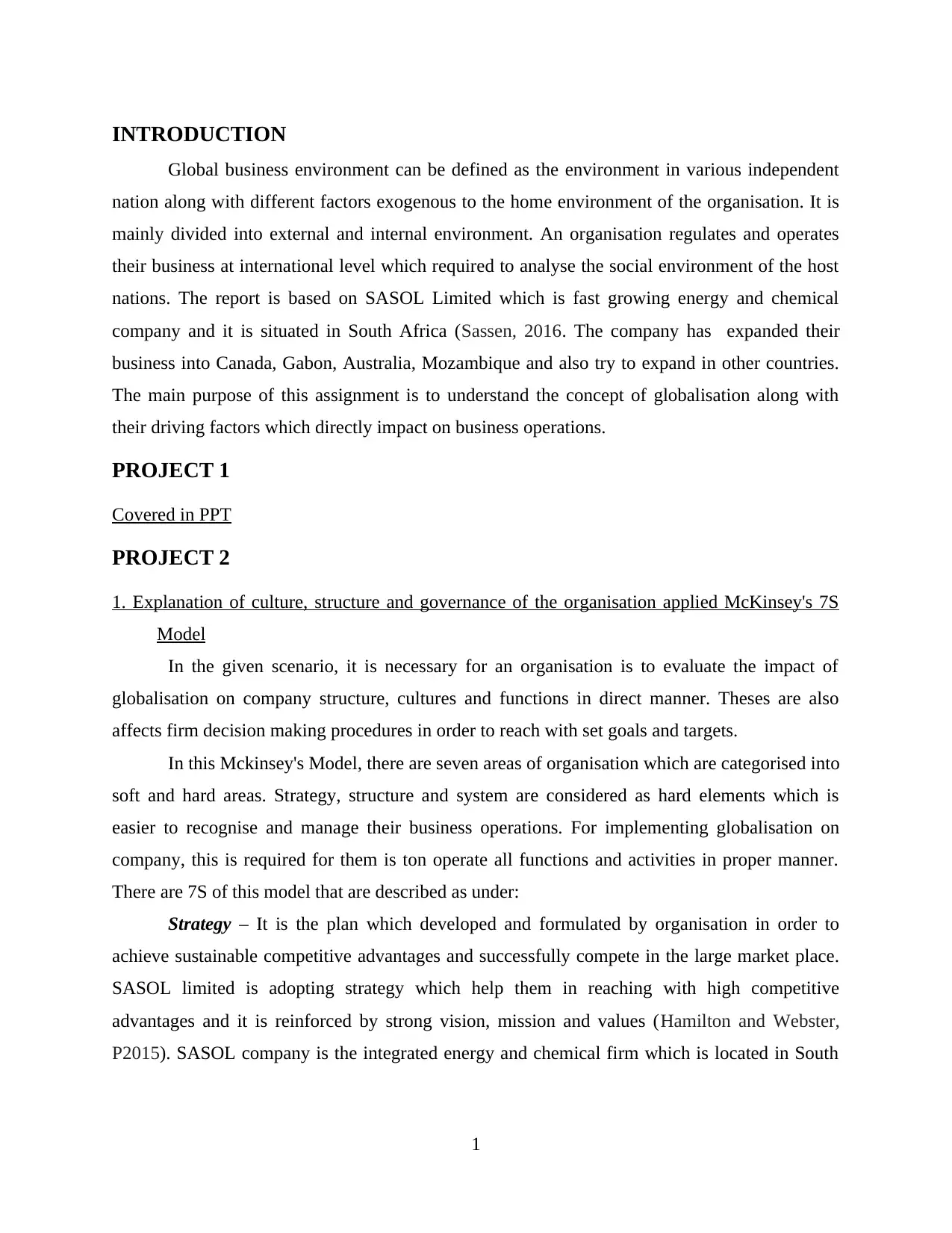
INTRODUCTION
Global business environment can be defined as the environment in various independent
nation along with different factors exogenous to the home environment of the organisation. It is
mainly divided into external and internal environment. An organisation regulates and operates
their business at international level which required to analyse the social environment of the host
nations. The report is based on SASOL Limited which is fast growing energy and chemical
company and it is situated in South Africa (Sassen, 2016. The company has expanded their
business into Canada, Gabon, Australia, Mozambique and also try to expand in other countries.
The main purpose of this assignment is to understand the concept of globalisation along with
their driving factors which directly impact on business operations.
PROJECT 1
Covered in PPT
PROJECT 2
1. Explanation of culture, structure and governance of the organisation applied McKinsey's 7S
Model
In the given scenario, it is necessary for an organisation is to evaluate the impact of
globalisation on company structure, cultures and functions in direct manner. Theses are also
affects firm decision making procedures in order to reach with set goals and targets.
In this Mckinsey's Model, there are seven areas of organisation which are categorised into
soft and hard areas. Strategy, structure and system are considered as hard elements which is
easier to recognise and manage their business operations. For implementing globalisation on
company, this is required for them is ton operate all functions and activities in proper manner.
There are 7S of this model that are described as under:
Strategy – It is the plan which developed and formulated by organisation in order to
achieve sustainable competitive advantages and successfully compete in the large market place.
SASOL limited is adopting strategy which help them in reaching with high competitive
advantages and it is reinforced by strong vision, mission and values (Hamilton and Webster,
P2015). SASOL company is the integrated energy and chemical firm which is located in South
1
Global business environment can be defined as the environment in various independent
nation along with different factors exogenous to the home environment of the organisation. It is
mainly divided into external and internal environment. An organisation regulates and operates
their business at international level which required to analyse the social environment of the host
nations. The report is based on SASOL Limited which is fast growing energy and chemical
company and it is situated in South Africa (Sassen, 2016. The company has expanded their
business into Canada, Gabon, Australia, Mozambique and also try to expand in other countries.
The main purpose of this assignment is to understand the concept of globalisation along with
their driving factors which directly impact on business operations.
PROJECT 1
Covered in PPT
PROJECT 2
1. Explanation of culture, structure and governance of the organisation applied McKinsey's 7S
Model
In the given scenario, it is necessary for an organisation is to evaluate the impact of
globalisation on company structure, cultures and functions in direct manner. Theses are also
affects firm decision making procedures in order to reach with set goals and targets.
In this Mckinsey's Model, there are seven areas of organisation which are categorised into
soft and hard areas. Strategy, structure and system are considered as hard elements which is
easier to recognise and manage their business operations. For implementing globalisation on
company, this is required for them is ton operate all functions and activities in proper manner.
There are 7S of this model that are described as under:
Strategy – It is the plan which developed and formulated by organisation in order to
achieve sustainable competitive advantages and successfully compete in the large market place.
SASOL limited is adopting strategy which help them in reaching with high competitive
advantages and it is reinforced by strong vision, mission and values (Hamilton and Webster,
P2015). SASOL company is the integrated energy and chemical firm which is located in South
1
⊘ This is a preview!⊘
Do you want full access?
Subscribe today to unlock all pages.

Trusted by 1+ million students worldwide
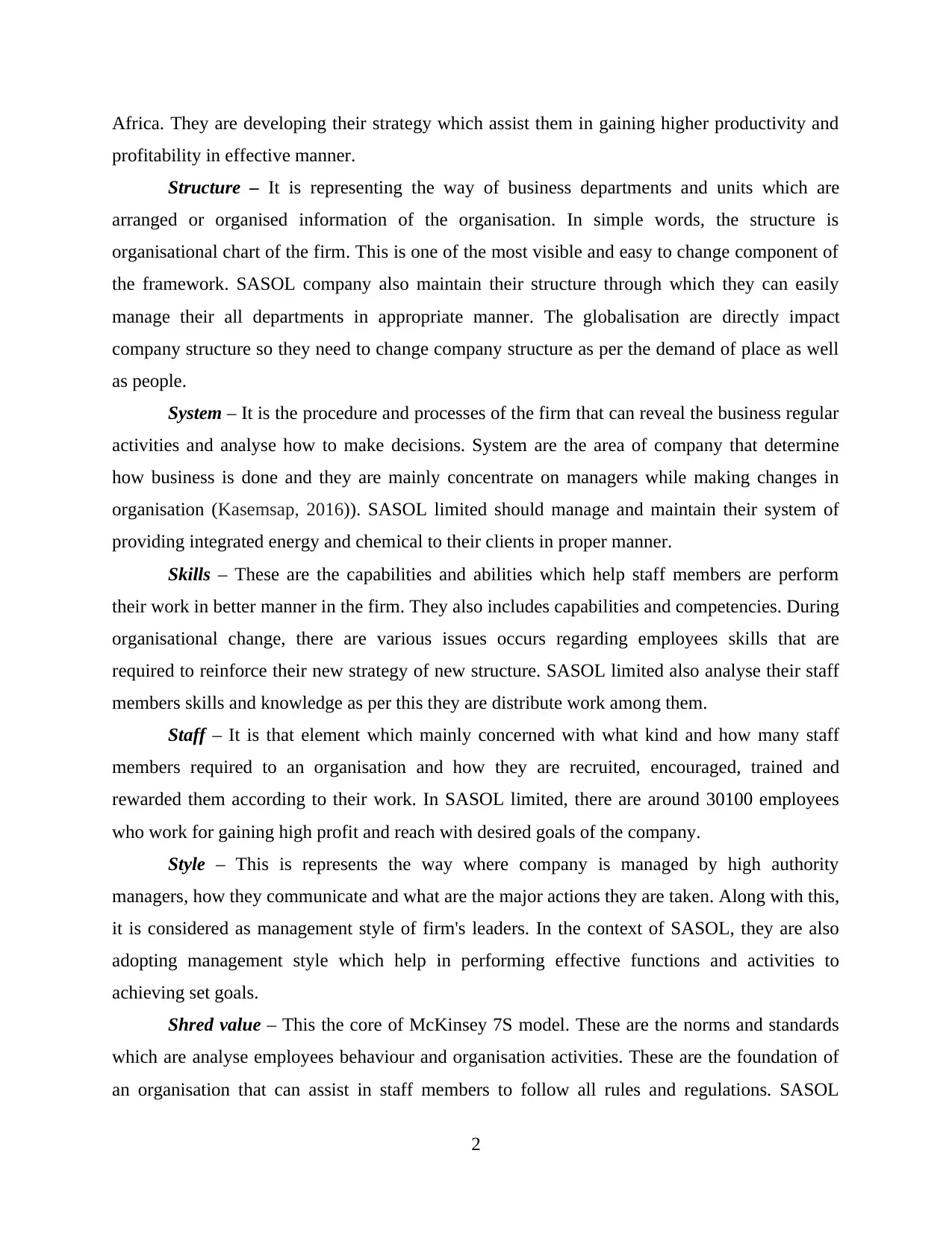
Africa. They are developing their strategy which assist them in gaining higher productivity and
profitability in effective manner.
Structure – It is representing the way of business departments and units which are
arranged or organised information of the organisation. In simple words, the structure is
organisational chart of the firm. This is one of the most visible and easy to change component of
the framework. SASOL company also maintain their structure through which they can easily
manage their all departments in appropriate manner. The globalisation are directly impact
company structure so they need to change company structure as per the demand of place as well
as people.
System – It is the procedure and processes of the firm that can reveal the business regular
activities and analyse how to make decisions. System are the area of company that determine
how business is done and they are mainly concentrate on managers while making changes in
organisation (Kasemsap, 2016)). SASOL limited should manage and maintain their system of
providing integrated energy and chemical to their clients in proper manner.
Skills – These are the capabilities and abilities which help staff members are perform
their work in better manner in the firm. They also includes capabilities and competencies. During
organisational change, there are various issues occurs regarding employees skills that are
required to reinforce their new strategy of new structure. SASOL limited also analyse their staff
members skills and knowledge as per this they are distribute work among them.
Staff – It is that element which mainly concerned with what kind and how many staff
members required to an organisation and how they are recruited, encouraged, trained and
rewarded them according to their work. In SASOL limited, there are around 30100 employees
who work for gaining high profit and reach with desired goals of the company.
Style – This is represents the way where company is managed by high authority
managers, how they communicate and what are the major actions they are taken. Along with this,
it is considered as management style of firm's leaders. In the context of SASOL, they are also
adopting management style which help in performing effective functions and activities to
achieving set goals.
Shred value – This the core of McKinsey 7S model. These are the norms and standards
which are analyse employees behaviour and organisation activities. These are the foundation of
an organisation that can assist in staff members to follow all rules and regulations. SASOL
2
profitability in effective manner.
Structure – It is representing the way of business departments and units which are
arranged or organised information of the organisation. In simple words, the structure is
organisational chart of the firm. This is one of the most visible and easy to change component of
the framework. SASOL company also maintain their structure through which they can easily
manage their all departments in appropriate manner. The globalisation are directly impact
company structure so they need to change company structure as per the demand of place as well
as people.
System – It is the procedure and processes of the firm that can reveal the business regular
activities and analyse how to make decisions. System are the area of company that determine
how business is done and they are mainly concentrate on managers while making changes in
organisation (Kasemsap, 2016)). SASOL limited should manage and maintain their system of
providing integrated energy and chemical to their clients in proper manner.
Skills – These are the capabilities and abilities which help staff members are perform
their work in better manner in the firm. They also includes capabilities and competencies. During
organisational change, there are various issues occurs regarding employees skills that are
required to reinforce their new strategy of new structure. SASOL limited also analyse their staff
members skills and knowledge as per this they are distribute work among them.
Staff – It is that element which mainly concerned with what kind and how many staff
members required to an organisation and how they are recruited, encouraged, trained and
rewarded them according to their work. In SASOL limited, there are around 30100 employees
who work for gaining high profit and reach with desired goals of the company.
Style – This is represents the way where company is managed by high authority
managers, how they communicate and what are the major actions they are taken. Along with this,
it is considered as management style of firm's leaders. In the context of SASOL, they are also
adopting management style which help in performing effective functions and activities to
achieving set goals.
Shred value – This the core of McKinsey 7S model. These are the norms and standards
which are analyse employees behaviour and organisation activities. These are the foundation of
an organisation that can assist in staff members to follow all rules and regulations. SASOL
2
Paraphrase This Document
Need a fresh take? Get an instant paraphrase of this document with our AI Paraphraser
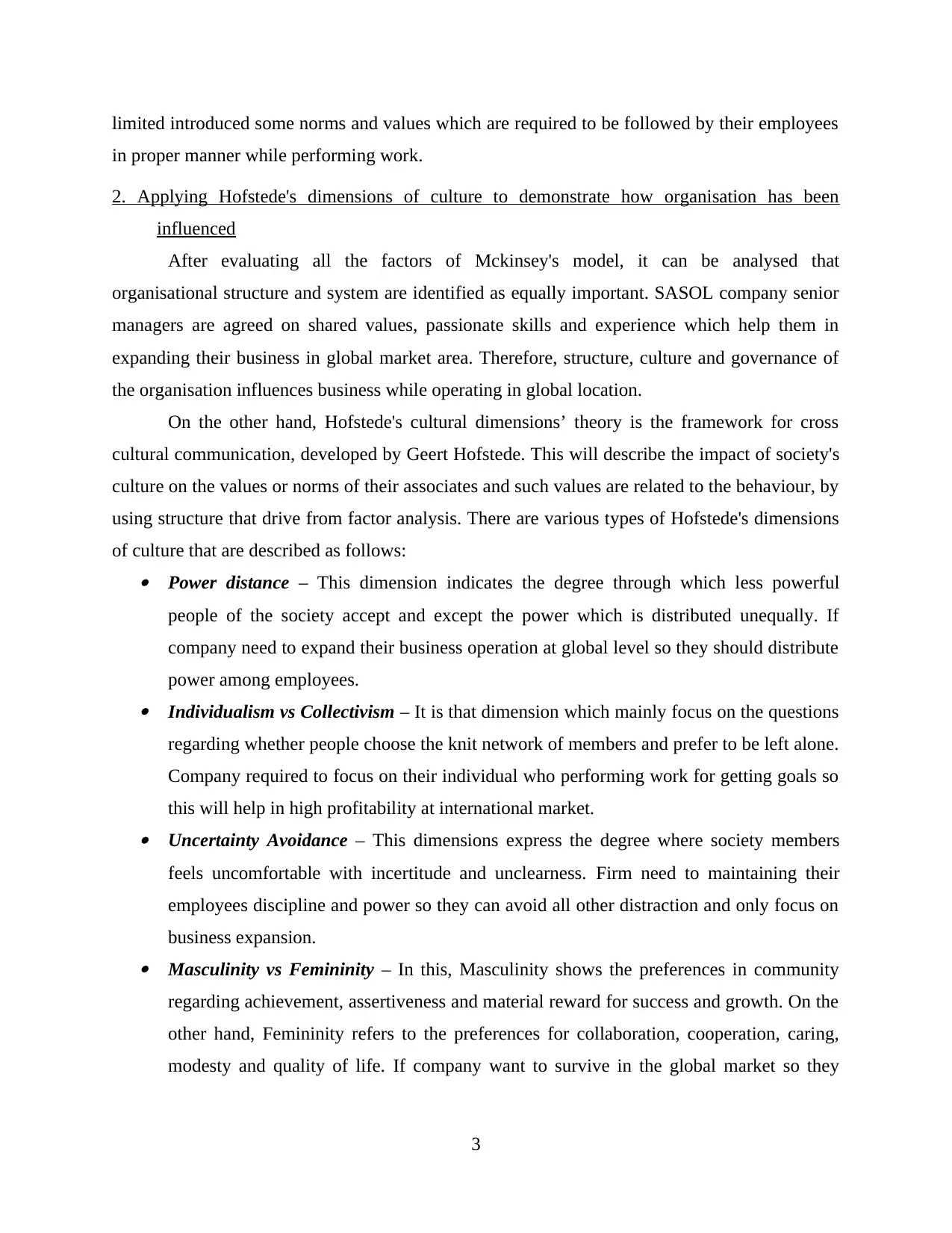
limited introduced some norms and values which are required to be followed by their employees
in proper manner while performing work.
2. Applying Hofstede's dimensions of culture to demonstrate how organisation has been
influenced
After evaluating all the factors of Mckinsey's model, it can be analysed that
organisational structure and system are identified as equally important. SASOL company senior
managers are agreed on shared values, passionate skills and experience which help them in
expanding their business in global market area. Therefore, structure, culture and governance of
the organisation influences business while operating in global location.
On the other hand, Hofstede's cultural dimensions’ theory is the framework for cross
cultural communication, developed by Geert Hofstede. This will describe the impact of society's
culture on the values or norms of their associates and such values are related to the behaviour, by
using structure that drive from factor analysis. There are various types of Hofstede's dimensions
of culture that are described as follows: Power distance – This dimension indicates the degree through which less powerful
people of the society accept and except the power which is distributed unequally. If
company need to expand their business operation at global level so they should distribute
power among employees. Individualism vs Collectivism – It is that dimension which mainly focus on the questions
regarding whether people choose the knit network of members and prefer to be left alone.
Company required to focus on their individual who performing work for getting goals so
this will help in high profitability at international market. Uncertainty Avoidance – This dimensions express the degree where society members
feels uncomfortable with incertitude and unclearness. Firm need to maintaining their
employees discipline and power so they can avoid all other distraction and only focus on
business expansion. Masculinity vs Femininity – In this, Masculinity shows the preferences in community
regarding achievement, assertiveness and material reward for success and growth. On the
other hand, Femininity refers to the preferences for collaboration, cooperation, caring,
modesty and quality of life. If company want to survive in the global market so they
3
in proper manner while performing work.
2. Applying Hofstede's dimensions of culture to demonstrate how organisation has been
influenced
After evaluating all the factors of Mckinsey's model, it can be analysed that
organisational structure and system are identified as equally important. SASOL company senior
managers are agreed on shared values, passionate skills and experience which help them in
expanding their business in global market area. Therefore, structure, culture and governance of
the organisation influences business while operating in global location.
On the other hand, Hofstede's cultural dimensions’ theory is the framework for cross
cultural communication, developed by Geert Hofstede. This will describe the impact of society's
culture on the values or norms of their associates and such values are related to the behaviour, by
using structure that drive from factor analysis. There are various types of Hofstede's dimensions
of culture that are described as follows: Power distance – This dimension indicates the degree through which less powerful
people of the society accept and except the power which is distributed unequally. If
company need to expand their business operation at global level so they should distribute
power among employees. Individualism vs Collectivism – It is that dimension which mainly focus on the questions
regarding whether people choose the knit network of members and prefer to be left alone.
Company required to focus on their individual who performing work for getting goals so
this will help in high profitability at international market. Uncertainty Avoidance – This dimensions express the degree where society members
feels uncomfortable with incertitude and unclearness. Firm need to maintaining their
employees discipline and power so they can avoid all other distraction and only focus on
business expansion. Masculinity vs Femininity – In this, Masculinity shows the preferences in community
regarding achievement, assertiveness and material reward for success and growth. On the
other hand, Femininity refers to the preferences for collaboration, cooperation, caring,
modesty and quality of life. If company want to survive in the global market so they
3
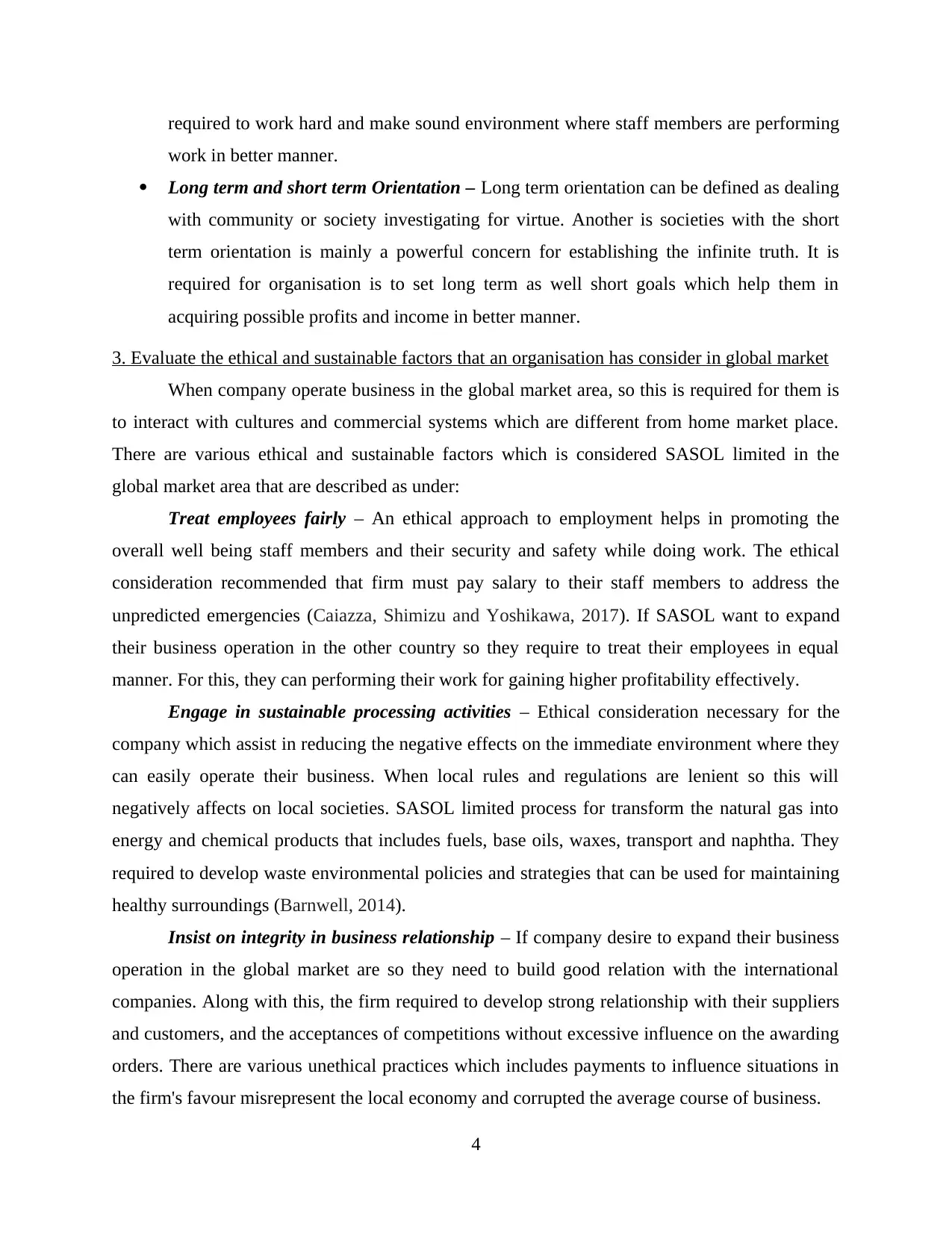
required to work hard and make sound environment where staff members are performing
work in better manner.
Long term and short term Orientation – Long term orientation can be defined as dealing
with community or society investigating for virtue. Another is societies with the short
term orientation is mainly a powerful concern for establishing the infinite truth. It is
required for organisation is to set long term as well short goals which help them in
acquiring possible profits and income in better manner.
3. Evaluate the ethical and sustainable factors that an organisation has consider in global market
When company operate business in the global market area, so this is required for them is
to interact with cultures and commercial systems which are different from home market place.
There are various ethical and sustainable factors which is considered SASOL limited in the
global market area that are described as under:
Treat employees fairly – An ethical approach to employment helps in promoting the
overall well being staff members and their security and safety while doing work. The ethical
consideration recommended that firm must pay salary to their staff members to address the
unpredicted emergencies (Caiazza, Shimizu and Yoshikawa, 2017). If SASOL want to expand
their business operation in the other country so they require to treat their employees in equal
manner. For this, they can performing their work for gaining higher profitability effectively.
Engage in sustainable processing activities – Ethical consideration necessary for the
company which assist in reducing the negative effects on the immediate environment where they
can easily operate their business. When local rules and regulations are lenient so this will
negatively affects on local societies. SASOL limited process for transform the natural gas into
energy and chemical products that includes fuels, base oils, waxes, transport and naphtha. They
required to develop waste environmental policies and strategies that can be used for maintaining
healthy surroundings (Barnwell, 2014).
Insist on integrity in business relationship – If company desire to expand their business
operation in the global market are so they need to build good relation with the international
companies. Along with this, the firm required to develop strong relationship with their suppliers
and customers, and the acceptances of competitions without excessive influence on the awarding
orders. There are various unethical practices which includes payments to influence situations in
the firm's favour misrepresent the local economy and corrupted the average course of business.
4
work in better manner.
Long term and short term Orientation – Long term orientation can be defined as dealing
with community or society investigating for virtue. Another is societies with the short
term orientation is mainly a powerful concern for establishing the infinite truth. It is
required for organisation is to set long term as well short goals which help them in
acquiring possible profits and income in better manner.
3. Evaluate the ethical and sustainable factors that an organisation has consider in global market
When company operate business in the global market area, so this is required for them is
to interact with cultures and commercial systems which are different from home market place.
There are various ethical and sustainable factors which is considered SASOL limited in the
global market area that are described as under:
Treat employees fairly – An ethical approach to employment helps in promoting the
overall well being staff members and their security and safety while doing work. The ethical
consideration recommended that firm must pay salary to their staff members to address the
unpredicted emergencies (Caiazza, Shimizu and Yoshikawa, 2017). If SASOL want to expand
their business operation in the other country so they require to treat their employees in equal
manner. For this, they can performing their work for gaining higher profitability effectively.
Engage in sustainable processing activities – Ethical consideration necessary for the
company which assist in reducing the negative effects on the immediate environment where they
can easily operate their business. When local rules and regulations are lenient so this will
negatively affects on local societies. SASOL limited process for transform the natural gas into
energy and chemical products that includes fuels, base oils, waxes, transport and naphtha. They
required to develop waste environmental policies and strategies that can be used for maintaining
healthy surroundings (Barnwell, 2014).
Insist on integrity in business relationship – If company desire to expand their business
operation in the global market are so they need to build good relation with the international
companies. Along with this, the firm required to develop strong relationship with their suppliers
and customers, and the acceptances of competitions without excessive influence on the awarding
orders. There are various unethical practices which includes payments to influence situations in
the firm's favour misrepresent the local economy and corrupted the average course of business.
4
⊘ This is a preview!⊘
Do you want full access?
Subscribe today to unlock all pages.

Trusted by 1+ million students worldwide
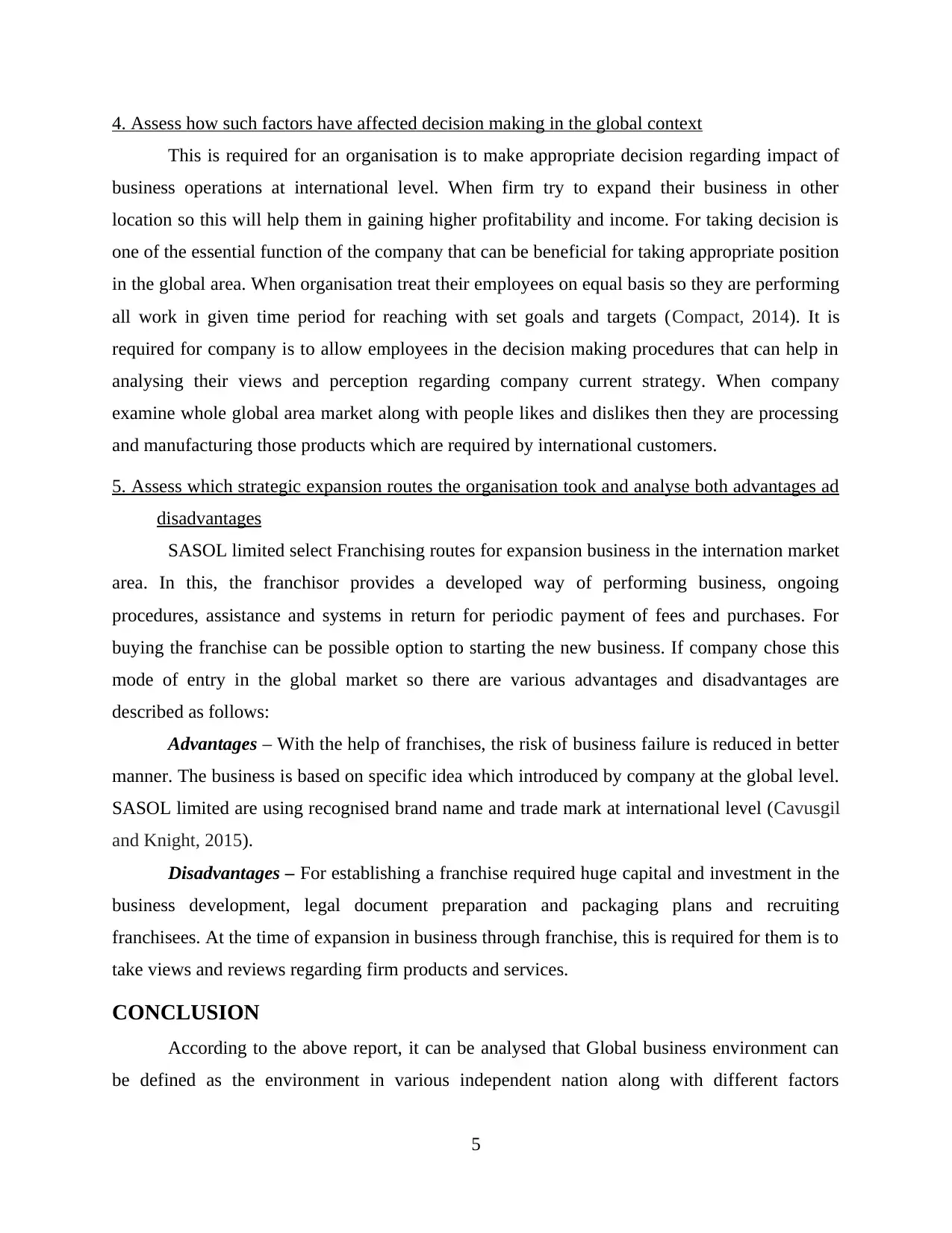
4. Assess how such factors have affected decision making in the global context
This is required for an organisation is to make appropriate decision regarding impact of
business operations at international level. When firm try to expand their business in other
location so this will help them in gaining higher profitability and income. For taking decision is
one of the essential function of the company that can be beneficial for taking appropriate position
in the global area. When organisation treat their employees on equal basis so they are performing
all work in given time period for reaching with set goals and targets (Compact, 2014). It is
required for company is to allow employees in the decision making procedures that can help in
analysing their views and perception regarding company current strategy. When company
examine whole global area market along with people likes and dislikes then they are processing
and manufacturing those products which are required by international customers.
5. Assess which strategic expansion routes the organisation took and analyse both advantages ad
disadvantages
SASOL limited select Franchising routes for expansion business in the internation market
area. In this, the franchisor provides a developed way of performing business, ongoing
procedures, assistance and systems in return for periodic payment of fees and purchases. For
buying the franchise can be possible option to starting the new business. If company chose this
mode of entry in the global market so there are various advantages and disadvantages are
described as follows:
Advantages – With the help of franchises, the risk of business failure is reduced in better
manner. The business is based on specific idea which introduced by company at the global level.
SASOL limited are using recognised brand name and trade mark at international level (Cavusgil
and Knight, 2015).
Disadvantages – For establishing a franchise required huge capital and investment in the
business development, legal document preparation and packaging plans and recruiting
franchisees. At the time of expansion in business through franchise, this is required for them is to
take views and reviews regarding firm products and services.
CONCLUSION
According to the above report, it can be analysed that Global business environment can
be defined as the environment in various independent nation along with different factors
5
This is required for an organisation is to make appropriate decision regarding impact of
business operations at international level. When firm try to expand their business in other
location so this will help them in gaining higher profitability and income. For taking decision is
one of the essential function of the company that can be beneficial for taking appropriate position
in the global area. When organisation treat their employees on equal basis so they are performing
all work in given time period for reaching with set goals and targets (Compact, 2014). It is
required for company is to allow employees in the decision making procedures that can help in
analysing their views and perception regarding company current strategy. When company
examine whole global area market along with people likes and dislikes then they are processing
and manufacturing those products which are required by international customers.
5. Assess which strategic expansion routes the organisation took and analyse both advantages ad
disadvantages
SASOL limited select Franchising routes for expansion business in the internation market
area. In this, the franchisor provides a developed way of performing business, ongoing
procedures, assistance and systems in return for periodic payment of fees and purchases. For
buying the franchise can be possible option to starting the new business. If company chose this
mode of entry in the global market so there are various advantages and disadvantages are
described as follows:
Advantages – With the help of franchises, the risk of business failure is reduced in better
manner. The business is based on specific idea which introduced by company at the global level.
SASOL limited are using recognised brand name and trade mark at international level (Cavusgil
and Knight, 2015).
Disadvantages – For establishing a franchise required huge capital and investment in the
business development, legal document preparation and packaging plans and recruiting
franchisees. At the time of expansion in business through franchise, this is required for them is to
take views and reviews regarding firm products and services.
CONCLUSION
According to the above report, it can be analysed that Global business environment can
be defined as the environment in various independent nation along with different factors
5
Paraphrase This Document
Need a fresh take? Get an instant paraphrase of this document with our AI Paraphraser
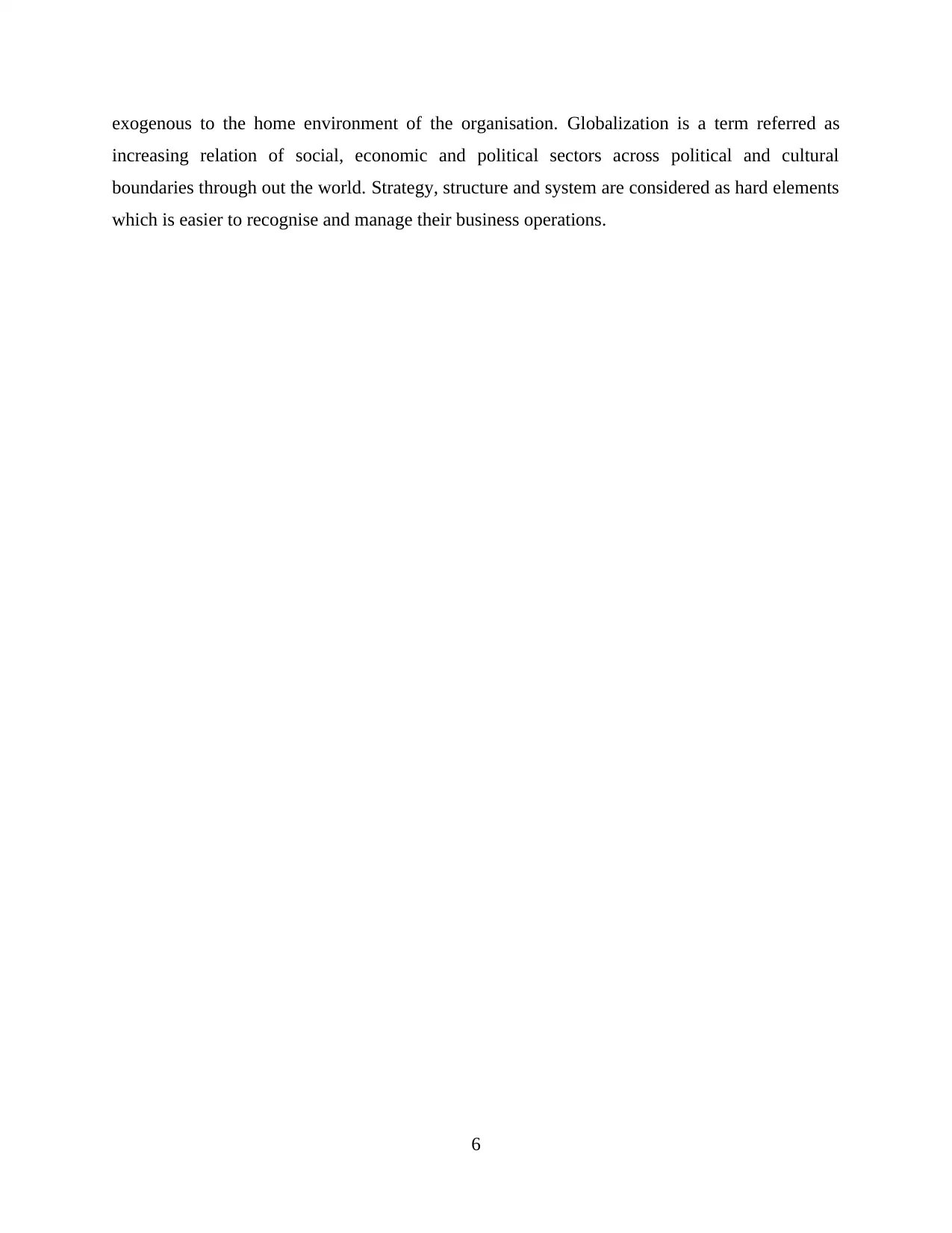
exogenous to the home environment of the organisation. Globalization is a term referred as
increasing relation of social, economic and political sectors across political and cultural
boundaries through out the world. Strategy, structure and system are considered as hard elements
which is easier to recognise and manage their business operations.
6
increasing relation of social, economic and political sectors across political and cultural
boundaries through out the world. Strategy, structure and system are considered as hard elements
which is easier to recognise and manage their business operations.
6
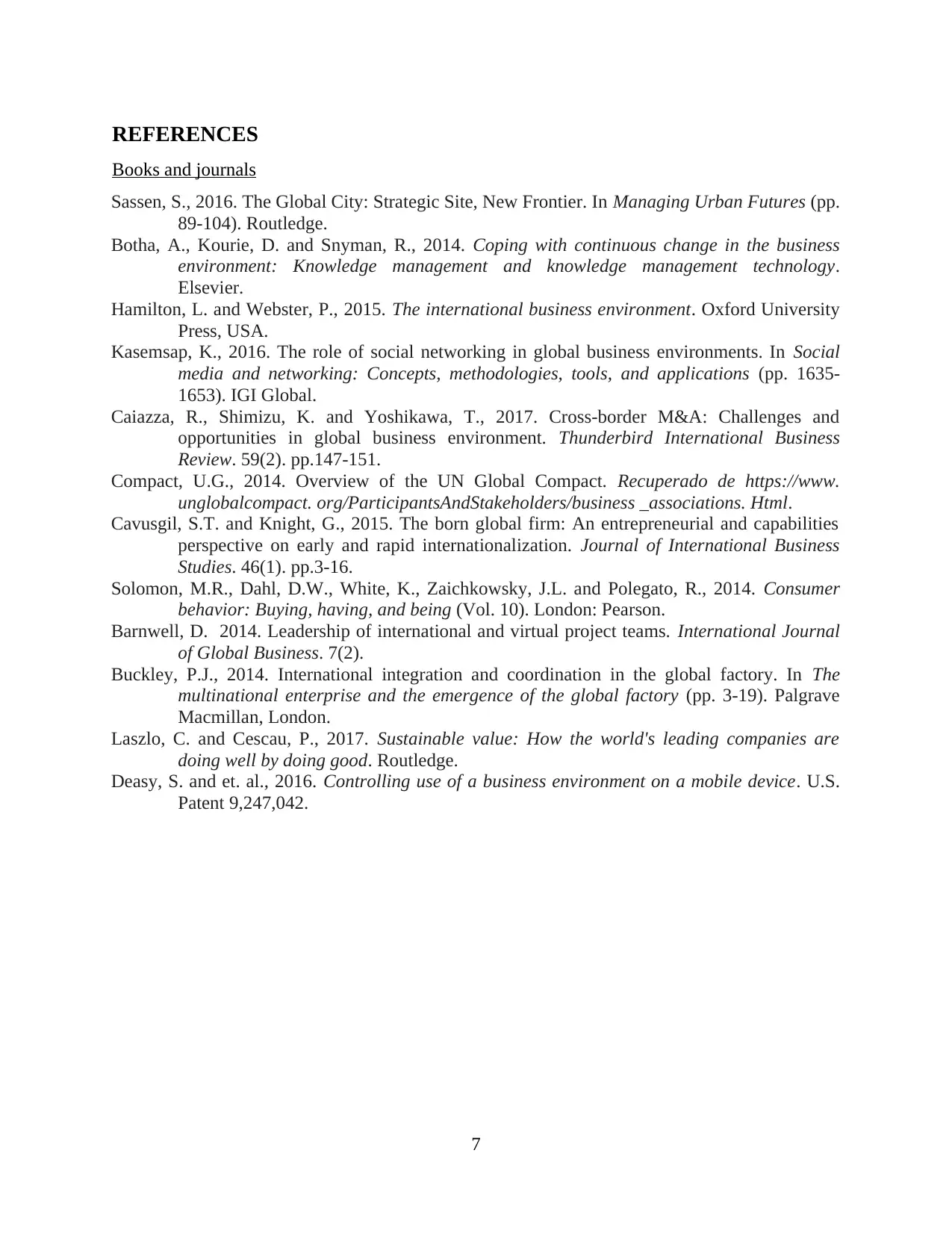
REFERENCES
Books and journals
Sassen, S., 2016. The Global City: Strategic Site, New Frontier. In Managing Urban Futures (pp.
89-104). Routledge.
Botha, A., Kourie, D. and Snyman, R., 2014. Coping with continuous change in the business
environment: Knowledge management and knowledge management technology.
Elsevier.
Hamilton, L. and Webster, P., 2015. The international business environment. Oxford University
Press, USA.
Kasemsap, K., 2016. The role of social networking in global business environments. In Social
media and networking: Concepts, methodologies, tools, and applications (pp. 1635-
1653). IGI Global.
Caiazza, R., Shimizu, K. and Yoshikawa, T., 2017. Cross‐border M&A: Challenges and
opportunities in global business environment. Thunderbird International Business
Review. 59(2). pp.147-151.
Compact, U.G., 2014. Overview of the UN Global Compact. Recuperado de https://www.
unglobalcompact. org/ParticipantsAndStakeholders/business _associations. Html.
Cavusgil, S.T. and Knight, G., 2015. The born global firm: An entrepreneurial and capabilities
perspective on early and rapid internationalization. Journal of International Business
Studies. 46(1). pp.3-16.
Solomon, M.R., Dahl, D.W., White, K., Zaichkowsky, J.L. and Polegato, R., 2014. Consumer
behavior: Buying, having, and being (Vol. 10). London: Pearson.
Barnwell, D. 2014. Leadership of international and virtual project teams. International Journal
of Global Business. 7(2).
Buckley, P.J., 2014. International integration and coordination in the global factory. In The
multinational enterprise and the emergence of the global factory (pp. 3-19). Palgrave
Macmillan, London.
Laszlo, C. and Cescau, P., 2017. Sustainable value: How the world's leading companies are
doing well by doing good. Routledge.
Deasy, S. and et. al., 2016. Controlling use of a business environment on a mobile device. U.S.
Patent 9,247,042.
7
Books and journals
Sassen, S., 2016. The Global City: Strategic Site, New Frontier. In Managing Urban Futures (pp.
89-104). Routledge.
Botha, A., Kourie, D. and Snyman, R., 2014. Coping with continuous change in the business
environment: Knowledge management and knowledge management technology.
Elsevier.
Hamilton, L. and Webster, P., 2015. The international business environment. Oxford University
Press, USA.
Kasemsap, K., 2016. The role of social networking in global business environments. In Social
media and networking: Concepts, methodologies, tools, and applications (pp. 1635-
1653). IGI Global.
Caiazza, R., Shimizu, K. and Yoshikawa, T., 2017. Cross‐border M&A: Challenges and
opportunities in global business environment. Thunderbird International Business
Review. 59(2). pp.147-151.
Compact, U.G., 2014. Overview of the UN Global Compact. Recuperado de https://www.
unglobalcompact. org/ParticipantsAndStakeholders/business _associations. Html.
Cavusgil, S.T. and Knight, G., 2015. The born global firm: An entrepreneurial and capabilities
perspective on early and rapid internationalization. Journal of International Business
Studies. 46(1). pp.3-16.
Solomon, M.R., Dahl, D.W., White, K., Zaichkowsky, J.L. and Polegato, R., 2014. Consumer
behavior: Buying, having, and being (Vol. 10). London: Pearson.
Barnwell, D. 2014. Leadership of international and virtual project teams. International Journal
of Global Business. 7(2).
Buckley, P.J., 2014. International integration and coordination in the global factory. In The
multinational enterprise and the emergence of the global factory (pp. 3-19). Palgrave
Macmillan, London.
Laszlo, C. and Cescau, P., 2017. Sustainable value: How the world's leading companies are
doing well by doing good. Routledge.
Deasy, S. and et. al., 2016. Controlling use of a business environment on a mobile device. U.S.
Patent 9,247,042.
7
⊘ This is a preview!⊘
Do you want full access?
Subscribe today to unlock all pages.

Trusted by 1+ million students worldwide
1 out of 9
Related Documents
Your All-in-One AI-Powered Toolkit for Academic Success.
+13062052269
info@desklib.com
Available 24*7 on WhatsApp / Email
![[object Object]](/_next/static/media/star-bottom.7253800d.svg)
Unlock your academic potential
Copyright © 2020–2026 A2Z Services. All Rights Reserved. Developed and managed by ZUCOL.




